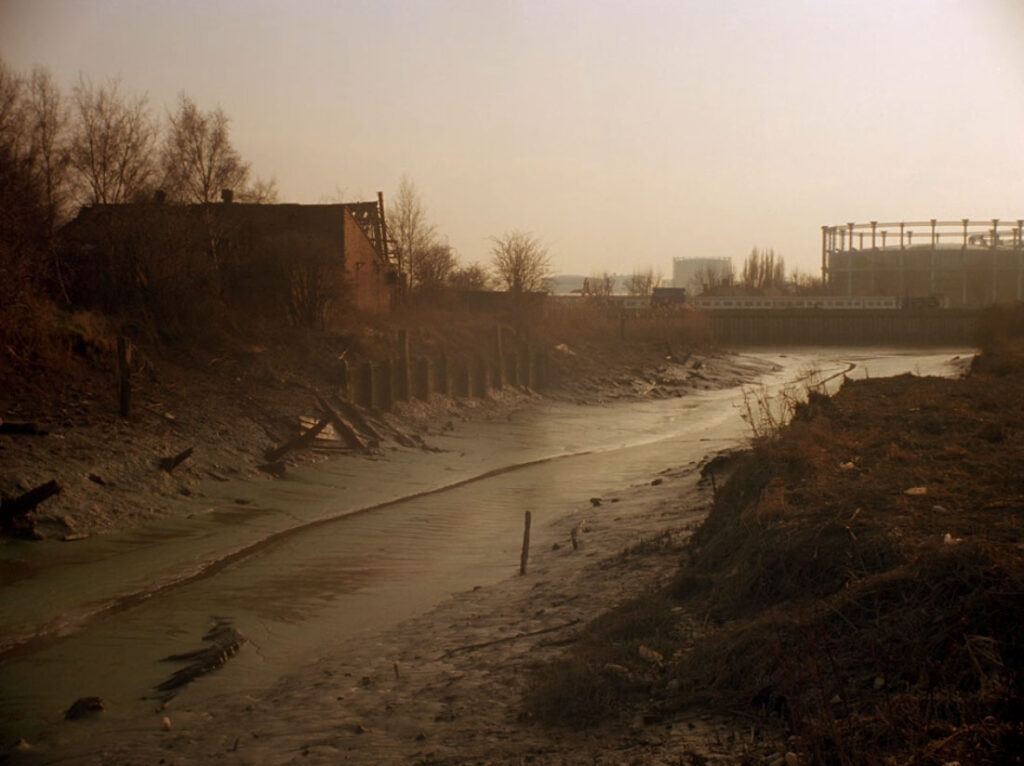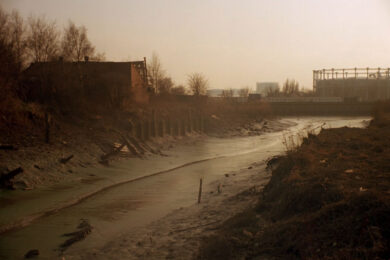On a grey and overcast day in 1994, I watched tranquil images of an unfamiliar city spool before me on the TV set in my parents’ living room. A mysterious narrator speaks of a “journey to the end of the world” over a shot of Tower Bridge, implying this famous structure is acting as some kind of portal. The voice continues, describing Britain’s fake traditions, ill health, bad food and sexual repression. I felt both downbeat and uplifted as the camera shifts from the Thames to a dried-up urban waterway, still and historic like a postcard on one of those dusty revolving racks in a seaside town. Beside a giant Victorian gasholder are sepia mud banks that might be a place for a horse in a Turner painting to stop and drink.
When I saw Patrick Keiller’s 85-minute film London for the first time I couldn’t resist its oddly magnetic pull as I started to negotiate for myself the interactions between music, place and memory. On the same currents there are tributaries and journeys downstream: around the same time, Saint Etienne released the album So Tough (1993) with its London cafes and wistful characters. Far ahead, so distant that the horizon is not yet touching the sky, a group called Real Lies would write lyrics about men who drink in A-road pubs on the outskirts, failing to spot the promise of escape in the rave flyers pinned up by the door.
London is an essay on “a city in decline”, something that is reinforced again and again in the narration that is at its heart a poem, delivered with a public information urgency by actor Paul Scofield. The narrator’s fictional identity is never revealed. All we know is that he is the intellectual companion and sometime lover of Robinson, the irritable but idealistic figure at the centre of events. London is the first in a trilogy of films about England’s capital city, followed by Robinson In Space and Robinson In Ruins; all of them set in UK general election years.
My first viewing of London started my own mental journey from my upbringing in North Yorkshire to the capital. Who was Robinson, the beleaguered art lecturer at the heart of the film, and what did he want me to know? The narrator describes a breakthrough in Robinson’s “investigations” but, in between Baudrillard quotes and “exercises in psychic landscaping” there’s no real clue as to what is being investigated other than the nebulous “problem of London”. What is urgent is the sense of journeys being taken, both through the politics of the day and a pilgrimage to the source of English romanticism. Through Robinson, there is nostalgia in the smell of urine in a phone box.
London is politically fixed in time as being April 1992, with footage of John Major on the steps of Downing Street and Tory party celebrations at their election victory. The narrator is not optimistic about the prospects for either the nation or Robinson himself. “The public transport system would degenerate into chaos”…“His job would be at risk and subjected to interference”… “He would drink more, he would be ill more often”… “He would die sooner.” The election is followed by seeing the aftermath of two Provisional IRA bomb attacks through Robinson’s eyes – one, the day after the election, has killed three people at the Baltic Exchange in the City of London, and another has destroyed a B&Q warehouse at Staples Corner on the North Circular road. Robinson describes a man who “begins to harangue us with conspiracy theories” following the blast in the city’s financial district. He is a “man of the crowd”, and Robinson finds himself siding with him: an eerie forward …



